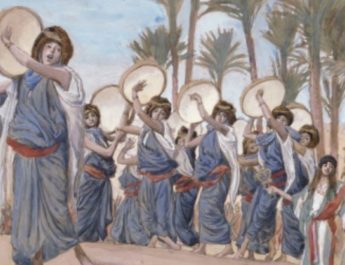John 17:6-19
Seventh Sunday of Easter B
BibleHub
6 “I have made your nameA knownB to thoseC
Notes on verse 6a
A “name” = onoma. May be from ginosko (know, recognize, learn from firsthand experience). This is a name, authority, cause, character, fame, reputation. The name was thought to include something of the essence of the person so it was not thought to be separate from the person.
B “made…known” = phaneroo. From phaneros (visible, apparent, clear, shining); from phos (light, a source of light, fire, or radiance; light with specific reference to what it reveals; luminousness whether natural or artificial, abstract or concrete, literal or figurative); from phao (to shine or make visible, especially with rays of light); from the same as phaino (to bring light, cause to appear, shine, become visible or clear). This is to make visible or clear, to make known. Properly, it is to illumine and so to make apparent or bring into open view.
C “those” = anthropos. Probably from aner (man, male, husband) + ops (eye, face); {from optanomai (to appear, be seen); perhaps from horao (become, seem, appear)}. This is human, humankind. Used for all genders.
whom you gaveD me from the world.E They wereF yours, and you gave them to me,
Notes on verse 6b
D “gave” = didomi. To give, offer, place, bestow, deliver. This is give in a literal or figurative sense.
E “world” = kosmos. Perhaps from the base of komizo (to carry, convey, recover); from komeo (to take care of). This is order, the world, the universe, including its inhabitants. Literally, this is something that is ordered so it can refer to all creation. It can also refer to decoration in the sense that something is better ordered and, thus, made more beautiful. This is where “cosmos” and “cosmetics” come from.
F “were” = eimi. This is to be, exist.
and they have keptG your word.H 7 Now they knowI that everythingJ you have given me is from you,
Notes on verses 6c-7
G “kept” = tereo. From teros (a guard or a watch that guards keep); perhaps related to theoreo (gazing, beholding, experiencing, discerning; looking at something to analyze it and concentrate on what it means; the root of the word “theatre” in that people concentrate on the action of the play to understand its meaning); from theaomai (to behold, look upon, see, contemplate, visit); from thaomai (to gaze at a spectacle; to look at or contemplate as a spectator; to interpret something in efforts to grasp its significance); from theoros (a spectator or envoy). This is to guard, observe, keep, maintain, or preserve. It can also be used f iguratively for spiritual watchfulness. It is guarding something from being lost or harmed – keeping an eye on it. Contrast the Greek phulasso, which is to guard something so that it doesn’t escape. Also contrast koustodia, which generally denotes a fortress or military presence. This word can mean fulfilling commands, keeping in custody, or maintaining. It can also figuratively mean to remain unmarried.
H “word” = logos. From lego (to speak, tell, mention). This is word, statement, speech, analogy. It is a word that carries an idea or expresses a thought, a saying. It could refer to a person with a message or reasoning laid out in words. By implication, this could be a topic, line of reasoning, or a motive. It can be used for a divine utterance or as Word – Christ.
I “know” = ginosko. Related to “name” in v6. See note A above.
J “everything” = pas. This is all or every.
8 for the wordsK that you gave to me I have given to them, and they have receivedL them and knowM in truthN
Notes on verse 8a
K “words” = rhema. From rheo (to speak, command, make, say, speak of); from ereo (to all, say, speak of, tell; denotes ongoing speech). This is word, which implies a matter or thing spoken, a command, report, promise, thing, or business. Often used for narration, commands, or disputes.
L “received” = lambano. It does not refer to passive receiving of something, but active acceptance or taking of something whether it is offered or simply nearby. It focuses on individual decision and action.
M “know” = ginosko. Same as “know” in v7. See note I above.
N “in truth” = alethos. 18x in NT. From alethes (true, unconcealed; true because it is in concert with fact and reality – attested. Literally, what cannot be hidden; truth stands up to test and scrutiny and is undeniable, authentic); from a (not) + lanthano (concealed, hidden, unnoticed; to shut one’s eyes to, unwittingly, unawares). This is truly, really, surely, truthfully, indeed. Properly, this is saying “in accordance with fact…” – what one is about to say can be proven and is true to reality.
that I cameO from you, and they have believedP that you sentQ me.
Notes on verse 8b
O “came” = exerchomai. From ek (from, from out of) + erchomai (to come, go). This is to go out, depart, escape, proceed from, spread news abroad.
P “believed” = pisteuo. From pistis (faith, faithfulness, belief, trust, confidence; to be persuaded or come to trust); from peitho (to have confidence, urge, be persuaded, agree, assure, believe, have confidence, trust). This is to believe, entrust, have faith it, affirm, have confidence in. This is less to do with a series of beliefs or doctrines that one believes and more to do with faithfulness, loyalty, and fidelity. It is trusting and then acting based on that trust.
Q “sent” = apostello. From apo (from, away from) + stello (to send, set, arrange, prepare, gather up); {probably from histemi (to make to stand, stand, place, set up, establish, appoint, stand firm, be steadfast)}. This is to send forth, send away, dismiss, send as a messenger. It implies one that is sent for a particular mission or purpose rather than a quick errand. This is where “apostle” comes from.
9 I am askingR on their behalf; I am not asking on behalf of the world but on behalf of those whom you gave me, because they are yours. 10 AllS mine are yours, and yours are mine, and I have been glorifiedT in them.
Notes on verses 9-10
R “asking” = erotao. Related to “words” in v8. From eromai (to ask) OR from ereo (see note K above). This is asking a question or making an earnest request. It is used between someone with whom the asker is close in some sense. So, they anticipate special consideration for their request.
S “all” = pas. Same as “everything” in v7. See note J above.
T “glorified” = doxazo. From doxa (glory, opinion, praise, honor, renown; particularly used as a quality of God or manifestation of God – splendor); from dokeo (to have an opinion, seem, appear, suppose; a personal judgment; to think); from dokos (opinion). This is to render or hold something as glorious, to glorify, honor, magnify, or celebrate. This is ascribing weight to something by recognizing its true value or essence.
11 And now I am no longer in the world, but they are in the world, and I am comingU to you. HolyV Father,W
Notes on verse 11a
U “coming” = erchomai. Related to “came” in v8. See note O above.
V “Holy” = hagios. From hagnos (holy, sacred, pure ethically, ritually, or ceremonially; prepared for worship, chaste, unadulterated, pure to the core; undefiled by sin; figurative for innocent, modest, perfect). God is totally different from humanity and thus set apart. That which is consecrated to worship God (elements of worship) or to serve God (as the saints) are holy because they are now set apart for God’s purposes. Holy because important to God. This is sacred physically, pure. It can be morally blameless or ceremonially consecrated.
W “Father” = pater. This is father in a literal or figurative sense. Could be elder, senior, ancestor, originator, or patriarch.
protectX them in your name that you have given me, so that they may be one,Y as we are one. 12 While I was with them, I protected them in your name that you have given me. I guardedZ them, and not one of them was lostAA
Notes on verses 11b-12a
X “protect” = tereo. Same as “kept” in v6. See note G above.
Y “one” = heis. This is one, a person, only, some.
Z “guarded” = phulasso. This is to guard something so that it doesn’t escape – to watch over it vigilantly. This is being on guard in a literal or figurative sense.
AA “was lost” = apollumi. From apo (from, away from) + ollumi (to destroy or ruin; the loss that comes from a major ruination). This is to destroy, cut off, to perish – perhaps violently. It can also mean to cancel or remove.
except the one destined to be lost,BB so that the scriptureCC might be fulfilled.DD
Notes on verse 12b
BB “one destined to be lost” = huios + ho + apoleia. Literally, “son of destruction.” Huios is son, descendant – a son whether natural born or adopted. It can be used figuratively for other forms of kinship. Apoleia is related to “was lost” in v12. 18x in NT. From apollumi (see note AA above). This is destruction, loss, something cut off, ruin, perdition. It can be any kind of loss whether tangible, spiritual, or eternal.
CC “scripture” = graphe. From grapho (to write). This is literally writing, a document. In the New Testament, this is always used for scripture.
DD “fulfilled” = pleroo. From pleres (to be full, complete, abounding in, occupied with). This is to fill, make full or complete. Properly, this is filling something up to the maximum extent that it can be filled – an appropriate amount for its individual capacity. So, this is used figuratively for furnish, influence, satisfy, finish, preach, perfect, and fulfill.
13 But now I am comingEE to you, and I speakFF these things in the world so that they may haveGG my joyHH made completeII in themselves.
Notes on verse 13
EE “coming” = erchomai. Same as “coming” in v11. See note U above.
FF “speak” = laleo. From lalos (talkative). This is to talk, say, or preach.
GG “have” = echo. This is to have, hold, possess.
HH “joy” = chara. From chairo (to rejoice, be glad or cheerful; a greeting); from char– (to extend favor, lean towards, be inclined to be favorable towards). This is joy, delight, gladness. Can be understood as the feeling you get when you are aware of grace.
II “made complete” = pleroo. Same as “fulfilled” in v12. See note DD above.
14 I have given them your word,JJ and the world has hatedKK them because they do not belongLL to the world, just as I do not belong to the world.
Notes on verse 14
JJ “word” = logos. Same as “word” in v6. See note H above.
KK “hated” = miseo. From misos (hatred). This word is used in two ways in the New Testament. One has to do with how we prioritize. In order to prioritize something the highest, it means we have to rank other things lower. We cannot have 10 number one priorities. So, the nine that are not number 1, we love less or we value them lower. We make a moral choice the springs from our values about where we put our time, efforts, energy, etc. The other way is detesting or hatred as we normally think of it. This sense has a particular affinity with persecuting the one we hate.
LL “belong” = eimi. Same as “were” in v6. See note F above.
15 I am not asking you to takeMM them out of the world, but I ask you to protect them from the evil one.NN 16 They do not belong to the world, just as I do not belong to the world. 17 SanctifyOO them in the truth;PP
Notes on verses 15-17a
MM “take” = airo. This is to lift up in a literal or figurative sense. So, it could mean to lift, carry, or raise. It could also imply lifting something in order to take it away or remove it. Figuratively, this can be used for raising the voice or level of suspense. It can mean sailing off as raising the anchor. It can also correspond to a Hebrew expression for atonement of sin (lift/remove sin).
NN “evil one” = poneros. From poneo (to toil); related to ponos (pain, trouble, labor, distress, suffering; toil, which implies anguish); from the base of penes (a laborer, poor person, starving or indigent person; someone who works for their living); from pernomai (working for a living; laborer, poor person; to work for daily bread); from peno (to toil to survive day by day). This is bad, evil, wicked, malicious, grievous, or toilsome. Properly, it is something that bears pain – it emphasizes the miseries and pains that come with evil. By contrast, the Greek kakos refers to evil as part of someone’s core character. Also contrasting the Greek sapros, which deals with falling away from a previously embodied virtue. This word can mean ill, diseased, morally culpable, derelict, vicious, malicious, or guilt. It can also refer to the devil or sinners.
OO “sanctify” = hagiazo. Related to “holy” in v11. From hagios (see note V above). This is to make holy, consecrate, sanctify, set apart as holy, purify, venerate.
PP “truth” = aletheia. Related to “in truth” in v8. From alethes (see note N above). Truth is literally that which is not or cannot be concealed. This word covers more than the sense of true versus false. It spoke of truth as that which corresponds to reality – reality as opposed to illusion. Thus, it includes, sincerity, straightforwardness, and reality itself.
your wordQQ is truth.RR 18 As you have sent me into the world, so I have sent them into the world. 19 And for their sakes I sanctify myself, so that they also may be sanctified in truth.SS
Notes on verses 17b-19
QQ “word” = logos. Same as “word” in v6. See note H above.
RR “truth” = aletheia. Same as “truth” in v17. See note PP above.
SS “truth” = aletheia. Same as “truth” in v17. See note PP above.
Image credit: “Jesus Christ” by Thomas Hawk, 2005.




